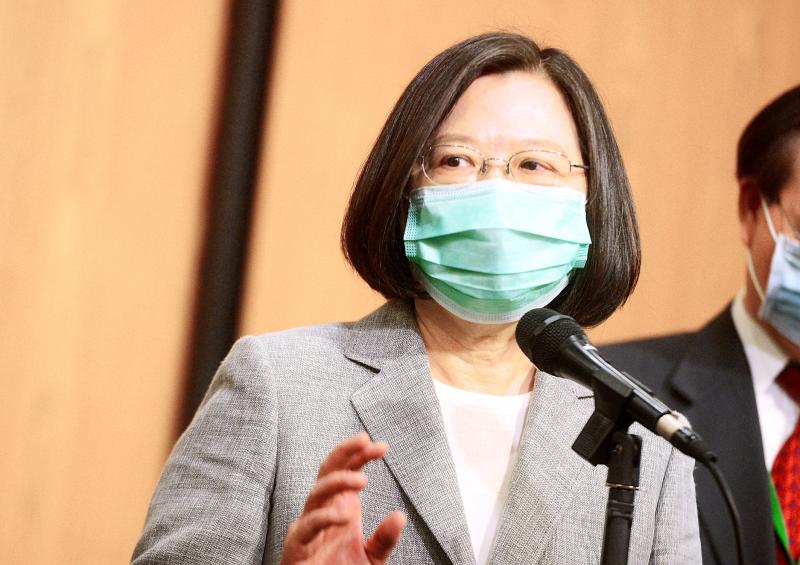The Taiwan-Hong Kong Services and Exchanges Office today officially opens, where it is to provide humanitarian assistance to Hong Kongers, after Beijing yesterday passed a controversial national security law for the territory.
President Tsai Ing-wen (蔡英文) expressed dismay over China’s passage of the law, saying that Beijing has broken its pledge to allow Hong Kong to maintain a high degree of autonomy for at least 50 years following its handover from the UK.
“I feel extremely disappointed [about the law’s passage], which means China did not keep its promise to Hong Kong,” Tsai said in Taipei.

Photo: CNA
Beijing’s “broken promise” also showed that the “one country, two systems” model for Hong Kong and Macau, which the Chinese government has also proposed for Taiwan, is not feasible for the nation, she said.
Tsai said she hoped that people in Hong Kong could continue to fight to maintain their freedoms, democracy and human rights after the law is implemented.
She again pledged that Taiwan would help Hong Kongers, citing the launch of the office to help those who want to come to Taiwan.
The office is to provide one-stop services for Hong Kongers who wish to study, do business, invest or seek asylum in Taiwan.
Although the office is new, the laws and guidelines related to the services provided are no more accommodating to people from Hong Kong than they were in the past.
The national security law is widely seen as an effort by the Chinese government to take full control of Hong Kong after a year of pro-democracy protests there.
In the Sino-British Joint Declaration signed by Britain and China in 1984, Beijing promised Hong Kong “a high degree of autonomy” for at least 50 years after China regained control of the territory in 1997.
“One country, two systems” refers to a constitutional principle formulated by then-Chinese leader Deng Xiaoping (鄧小平) in the early 1980s, who suggested that there would be only “one China,” but distinct Chinese regions, such as Hong Kong and Macau, could retain their own economic and administrative systems.
Meanwhile, Taipei Deputy Mayor Tsai Ping-kun (蔡炳坤) said that the city already has the resources to assist Hong Kongers wanting to work, study or live in Taipei.
The city has services in place to help new immigrants, and has now established an office specifically to assist newcomers from Hong Kong, he said, adding that Taipei has seen an influx of people from Hong Kong in the past few years.
In 2018, 4,148 people moved from Hong Kong to Taipei, and last year that number rose to 5,898, he said, adding that in the first four months of this year alone the figure was 2,383.
This story has been amended since it was first published.

The Central Election Commission has amended election and recall regulations to require elected office candidates to provide proof that they have no Chinese citizenship, a Cabinet report said. The commission on Oct. 29 last year revised the Measures for the Permission of Family-based Residence, Long-term Residence and Settlement of People from the Mainland Area in the Taiwan Area (大陸地區人民在台灣地區依親居留長期居留或定居許可辦法), the Executive Yuan said in a report it submitted to the legislature for review. The revision requires Chinese citizens applying for permanent residency to submit notarial documents showing that they have lost their Chinese household record and have renounced — or have never

A magnitude 5.6 earthquake struck off the coast of Yilan County at 12:37pm today, with clear shaking felt across much of northern Taiwan. There were no immediate reports of damage. The epicenter of the quake was 16.9km east-southeast of Yilan County Hall offshore at a depth of 66.8km, Central Weather Administration (CWA) data showed. The maximum intensity registered at a 4 in Yilan County’s Nanao Township (南澳) on Taiwan’s seven-tier scale. Other parts of Yilan, as well as certain areas of Hualien County, Taipei, New Taipei City, Taoyuan, Hsinchu County, Taichung and Miaoli County, recorded intensities of 3. Residents of Yilan County and Taipei received

Taiwan has secured another breakthrough in fruit exports, with jujubes, dragon fruit and lychees approved for shipment to the EU, the Ministry of Agriculture said yesterday. The Animal and Plant Health Inspection Agency on Thursday received formal notification of the approval from the EU, the ministry said, adding that the decision was expected to expand Taiwanese fruit producers’ access to high-end European markets. Taiwan exported 126 tonnes of lychees last year, valued at US$1.48 million, with Japan accounting for 102 tonnes. Other export destinations included New Zealand, Hong Kong, the US and Australia, ministry data showed. Jujube exports totaled 103 tonnes, valued at

BIG SPENDERS: Foreign investors bought the most Taiwan equities since 2005, signaling confidence that an AI boom would continue to benefit chipmakers Taiwan Semiconductor Manufacturing Co’s (TSMC, 台積電) market capitalization swelled to US$2 trillion for the first time following a 4.25 percent rally in its American depositary receipts (ADR) overnight, putting the world’s biggest contract chipmaker sixth on the list of the world’s biggest companies by market capitalization, just behind Amazon.com Inc. The site CompaniesMarketcap.com ranked TSMC ahead of Saudi Aramco and Meta Platforms Inc. The Taiwanese company’s ADRs on Tuesday surged to US$385.75 on the New York Stock Exchange, as strong demand for artificial intelligence (AI) applications led to chip supply constraints and boost revenue growth to record-breaking levels. Each TSMC ADR represents